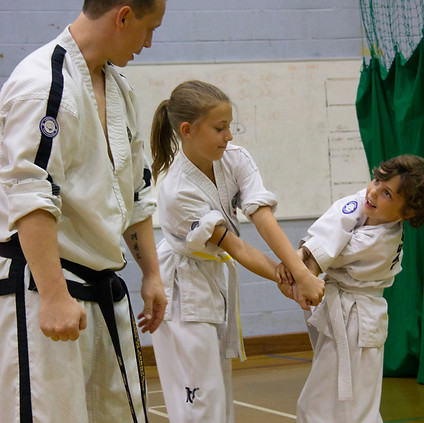
TRAINING
PATTERNS
.jpg)
Patterns (Tul) are a set of fundamental movements both offensive and defensive performed against an imaginary opponent. Pattern is the structure of TaeKwon-Do,
it is practiced so that we learn to develop and shape our movements as well as helping the student understand the applications for our techniques and develop power.
There are a total of 24 Patterns in Taekwon-Do ranging in technical ability and difficulty from beginner level to 6th Degree Black Belt.
SPARRING

Sparring (Matsogi) is our chance to practice our techniques against an opponent in a controlled environment. There are many different types of sparring such as;
Step Sparring: Using our techniques from Patterns we can practice our attacking and defence using set movements. This is a good way to improve on our understanding of what we are trying to achieve in patterns and also is a valuable training method to improve on accuracy.
Semi-Free Sparring: Using the same structure as Step Sparring we now perform
attacks randomly instead of using set movements. It is a good test for the student to try and determine the appropriate block and counter for the situation presented.
Free Sparring: Using safety equipment free sparring is used to practice by scoring points to vital spots on the body and head, this is a popular part of Taekwon-Do that promotes the competitive side of our martial art and is a great chance to put what we have learned to the test.
POWER

Taekwon-Do is a martial art that has a scientific outlook on how we perform our techniques in order maximise on power (The Theory of Power).
We test this by breaking boards both standing and in the air using a variety of kicks and
strikes.
SELF-DEFENCE

In Taekwon-Do we use many different blocking and attacking tools to defend ourselves.
By learning the correct applications and vital spots we practice effective self defence against strikes, grabs and
close situations using counters and take-downs.
